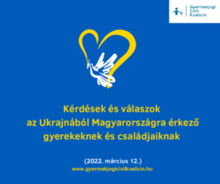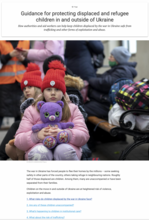Demographic Data
|
Sources: World Bank, UNICEF,UNDP HDR 2015, DHS 2014 |
Displaying 1831 - 1840 of 14348
Цей посібник розроблено для молодих людей та їхніх сімей, які тікають від конфлікту в Україні до Угорщини. Він містить основні практичні запитання та відповіді, щоб допомогти тим, хто потребує негайної допомоги після прибуття в Угорщину. Цей ресурс був складений Громадянською коаліцією за права дитини, найбільшою професійною мережею громадянського суспільства в Угорщині з прав дитини.
Ez az útmutató azoknak a fiataloknak és családtagjaiknak készült, akik az ukrajnai konfliktus elől Magyarországra menekülnek. Alapvető gyakorlati kérdésekkel és válaszokkal segíti azokat, akiknek Magyarországra érkezéskor azonnali segítségre van szükségük. Ezt a forrásanyagot a Civil Koalíció a Gyermekjogiért Magyarország legnagyobb gyermekjogi szakmai hálózata, a Civil Koalíció a Gyermekjogiért állította össze.
This guide is designed for young people and their families fleeing the conflict in Ukraine to Hungary. It provides basic practical questions and answers to help those who need immediate assistance upon arrival in Hungary. This resource was compiled by the Civil Coalition for the Rights of the Child, Hungary's largest civil society professional network on the rights of the child.
In this Lancet article, the author Saleyha Ahsan highlights the growing threat faced by Ukraine's 7·5 million children as the conflict continues. Children are being killed or wounded through direct attacks by Russian military or they have been forced to flee their homes to an uncertain future. In a statement to The Lancet, WHO called for international humanitarian and human rights law to be upheld. “The number of civilians, including children, dying as a result of the military offensive in Ukraine keeps rising. This must stop. The protection of civilians must be priority number one.”
As many as 20% of all child deaths from Covid in the US have occurred during the Omicron surge of the pandemic. Children seem to be facing increasing risks from COVID-19 even as mask mandates drop across the country, and vaccination rates among children stall out at alarmingly low rates.
This report is produced by OCHA Ukraine in collaboration with humanitarian partners.
It covers the period from 3 p.m. (EET) 10 March to 3 p.m. (EET) 11 March.
Traffickers are targeting parentless children on the Ukraine-Poland border, says a group evacuating orphanages in the war zone.
Children seem to be facing increasing risks as mask mandates are abandoned and vaccination rates stall.
The war in Ukraine has displaced more than 2 million people as they flee their country to find refuge. Roughly half of those displaced are children. Among them, many are unaccompanied or have been separated from their families. Children on the move in and outside of Ukraine are at heightened risk of violence, exploitation and abuse. This guidance, produced by the UNICEF team, outlines how authorities and aid workers can help keep children displaced by the war in Ukraine safe from trafficking and other forms of exploitation and abuse.
This is a market study conducted by the Competition and Markets Authority (CMA) into children's social care provision in the UK. The study found that there is a shortage of appropriate places in children’s homes and with foster carers, meaning that some children are not getting the right care from their placement. Some children are also being placed too far away from where they previously lived or in placements that require them to be separated from their siblings.The authors recommend the development of national and regional bodies to support local authorities with getting suitable placements for children in the UK.






